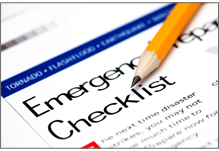
Essential Tips for Seniors to Be Prepared for an Emergency
It may not be so surprising to read that older adults visit the emergency room more frequently than any other age group. The Centers for Disease Control and Prevention shares that the emergency department rate for adults aged 60 and above is 43 visits per 100 persons above 60 years. This rate increases as older adults grow older.
The emergencies older adults face aren’t limited to medical emergencies. Natural disasters, such as tornadoes, floods, or excessive heat conditions can leave many older adults stranded. Older adults face more obstacles than younger cohorts during emergencies. Limited mobility, chronic health conditions, and isolation create obstacles for older adults to get the help they need amid a crisis.
All older adults should know what to do in the event of an emergency. Whether it’s a medical emergency or a natural disaster, having a plan can help older adults save time and energy. Here are four essential tips for seniors to help them be more prepared should an emergency happen shortly.
Gather Pertinent Information
There’s nothing worse than not knowing where you’ve put essential documents when you’re facing a crisis. Older adults can be prepared for an emergency by gathering pertinent information and keeping it in a safe place. Important documents, such as your will or estate plans, advance directives, insurance information, and other legal paperwork should be stored in a waterproof portable container. Older adults should also keep a current list of their medications, as well as their physicians’ names and phone numbers. In addition, include a list of phone numbers for family members involved in your care so that someone else can contact them if you’re unable to do so yourself.
Create an Emergency Supply
Older adults should also create an emergency supply and keep it replenished. The Centers for Disease Control and Prevention recommends having a three-day food and water supply for each person and/or pet in your household. In addition to food and water, older adults should also have a stocked first aid kit and medications. Doctors can help older adults safely stockpile prescription medications in the case of an emergency. Other emergency supplies that are good to have around the home include flashlights with extra batteries, a battery-operated radio, hand sanitizer, hand sanitizer, disinfecting wipes, a can opener, and a way to communicate to family (one-time phone or portable cell phone charger).
Communicate Your Plan with Your Family
When communicating with your family, older adults should inform their families about their emergency plans. Let your family know where you plan to go should you need to evacuate your home. In the event of a house fire, identify where your family can find you (neighbor’s house, across the street at a park, etc.). Your family should be aware of your preferred emergency hospital and where they can find your legal documents. Your medical power of attorney should know your advance directives and feel confident that they can make decisions on your behalf should they need to do so. If you haven’t already, establish a check-in system with family members, especially if you live alone. It’s always better to over-communicate than to be caught off guard in the event of a crisis.
Learn How to Receive Emergency Notifications
Finally, there’s no better way to be prepared for an emergency than to receive emergency notifications in advance. News stations often broadcast information about impending natural disasters. However, if you don’t have the television or radio on all day, you might miss something important. Consider purchasing an emergency or weather radio that broadcasts emergency bulletins. Alternatively, sign up to receive emergency alerts on your smartphone. Most local communities can push out emergency notifications via text or email. Check with your local government for information about how to sign up. In addition to natural emergencies, if you have a chronic health condition you may want to consider purchasing a medic alert device. Talk with your family about which system might work best for you, or ask your doctor for their recommendation.
Another essential tip for seniors to be prepared for an emergency is to partner with Visiting Angels Oshkosh. As one of America’s most trusted and respected elder care providers, our mission is to help you remain where you feel happiest, safest, and most comfortable. Preparing for the unexpected is simply part of our professional training, so you can rest assured that you are in good hands. We are proud to offer superior elder care to aging persons in our community and want to be a safety net for you during difficult times. If you could benefit from home elder care, please contact us today to learn more about our services.
